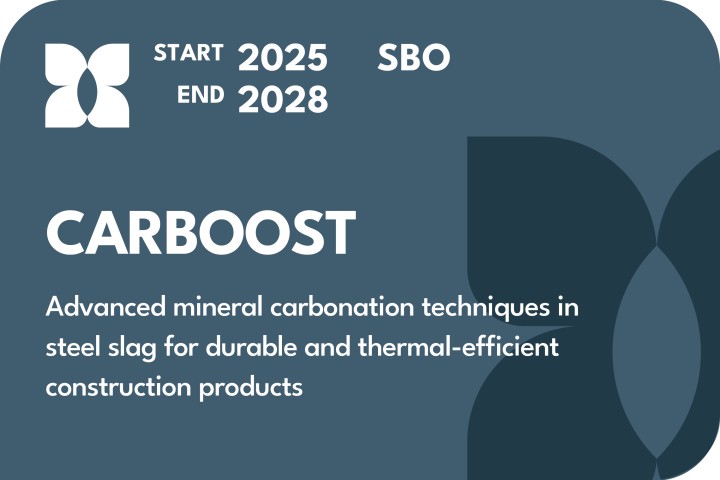CARBOOST
Advanced mineral carbonation techniques in steel slag for durable and thermal-efficient construction products. The CARBOOST project aims to establish the next generation of high-porosity, mineral carbonation materials for construction and renovation, optimizing their thermal, mechanical, and environmental performance with reductions in both embedded and operational carbon emissions.

The building sector must reduce carbon emissions
The building and construction industry faces increasing pressure to reduce its carbon footprint and enhance sustainability. This involves the carbon emissions during the production stage (embedded carbon) and the use stage (operational carbon). Traditional materials like cement and clay products are energy-intensive and rely on non-renewable resources. In contrast, carbonation-based materials offer a carbon-negative alternative that utilizes secondary raw materials and requires significantly less energy.
Lightweight mineral carbonation materials offer an efficient, low-carbon alternative
CARBOOST focuses on understanding the interrelations between porosity, microstructure, and material properties to design tailored low-carbon renovation materials. Key research areas include controlling pore structures during synthesis, real-time monitoring of CO2 uptake, and multi-scale modelling of carbonation processes. The project also seeks to assess these materials' environmental benefits through life cycle analysis and hygrothermal simulations.
Enabling low-carbon, multifunctional building materials to boost Flanders' green economy
CARBOOST directly supports decarbonization goals by generating the knowledge needed to develop lightweight construction products tailored not only for thermal insulation, but also potentially fire protection, and acoustic insulation. These developments are complemented by carbonate-sensing technologies and custom software solutions. The project aims to lay the foundation for scalable, sustainable building materials that integrate carbon sequestration with superior functional properties.
Project Partners
The consortium of the CARBOOST project consists of four research partners: the Flemish Institute for Technological Research (VITO), KU Leuven, the Belgian Nuclear Research Centre (SCK-CEN), and Ghent University.